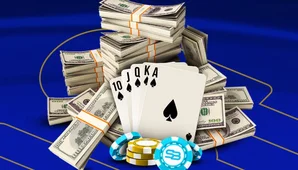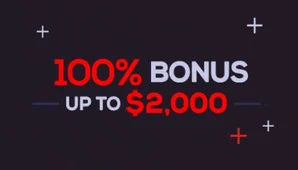The A-Game recently dove deep into the backstory, rise, and end of OtB_RedBaron. This online player dominated the 2010s, to a point where other professionals avoided sitting down at tables with him. Millions of dollars were won in his career and RedBaron certainly etched his name into online poker history. He was feared, respected, and ahead of his peers in several ways.
You can watch the full story on the A-Game channel, narrated by Brdz1 and Avr0ra. For those who prefer reading the history of RedBaron, the entire story is right here.
By the end of 2015, after beating Phil Ivey, I came back to playing NL once again. I got back in shape rather quickly, and in a couple of days, I felt just as I did before. "Bring me as many deep tables as you got," Dima has won many buy-ins last month and said that games are soft. I did not know yet.
After a thousand hours between us, it was really hard to surprise each other. We had a good grasp of opponent strategy and a number of counter-strategies for pretty much any spot. One day, I found myself playing against him and another guy. We opened a few tables and started playing three-max. Everything was fine in the beginning, and then bam! He shows a hand in a line I would never expect him to have. Not only have I lost a big pot, this hand also showed that the global strategy I chose for this specific spot on the turn was certainly not good.
Little by little, I come to my senses, turning on my full Focus mode, and then bam, again!
A pleasant feeling starts filling my body, that rarely happens after you just lost five buy-ins in the beginning of the session. He did it. It was important for him to prove it to himself, and he did. After a month, he retired from poker.
I think not many reporters knew, but at the time Forhayley retired from poker, he was the best 6-max NL player in the world. He knew it, I knew it, and I'm pretty sure RedBaron also knew it."
Brdz1: But wait, what Baron are we talking about?

OtB_RedBaron is one of the key players in poker history. At different times, people have always argued who is the best player in the world, whether it's Forhayley, Timofey "Trueteller" Kuznetsov, or Nikita Bodyakovskiy, or LLinusLLove, or Stefan Burakov. Today, maybe DavyJones992, TaxHere, or Linus Loeliger again. Every top player could have been considered the best in the world at some point. Let's ask a high-stakes regular.
Avr0rа: "Key player in poker's history" is a very accurate description of OtB_RedBaron. All the best players in the world learned from his play, and the concepts that he came up with (and I remind you that there were no solvers at that time) are still relevant today. We will talk about the technical aspects of his game, and we will also follow the story of his transformation from an advanced amateur to the best player in the world.
Brdz1: It's always like that with those outstanding players. For example, lately, we've been checking out MunEZ_StaRR's database, and you know, like in RPG games, you have those stat points you should distribute between different talents. Like, you have 25 went to showdown (WTSD), 52 won at showdown (W$SD), and 47 won when saw a flop (WWSF). Well, those guys have like 10 points more: 30 went to showdown, 54 won at showdown, and 49 won when saw a flop. And you just don't know where he gets those extra points, what makes the difference.
Avr0rа: Well, "the best player in the world" is a very vague concept. I mean, who is the best? The one who wins the most, or the one who is the best in terms of technical abilities, or the one who holds lobbies for the most hours? All of those parameters can be estimated differently, so it's very subjective in the end.
In chess, for example, it's a whole different story. ELO ranking, and the World Chess championships – they have it figured out. In poker, we have none of that. So when we say that Forhayley or OtB_RedBaron are the best in the world, it's just a combined experience of their opponents, how many players want to be in wars against them, how many players want to fight for lobbies with them, and so on.
Brdz1: So yeah, pretty much for all the time in poker, the question of who is the best in the world was unclear, except probably for this one period of time.
Let's get back to 2010s where pretty much all the players and all the viewers were unanimous in opinion on who is the best in the world. I remember me and my friends watching it, being amazed at how RedBaron dominates the best high-stakes players.
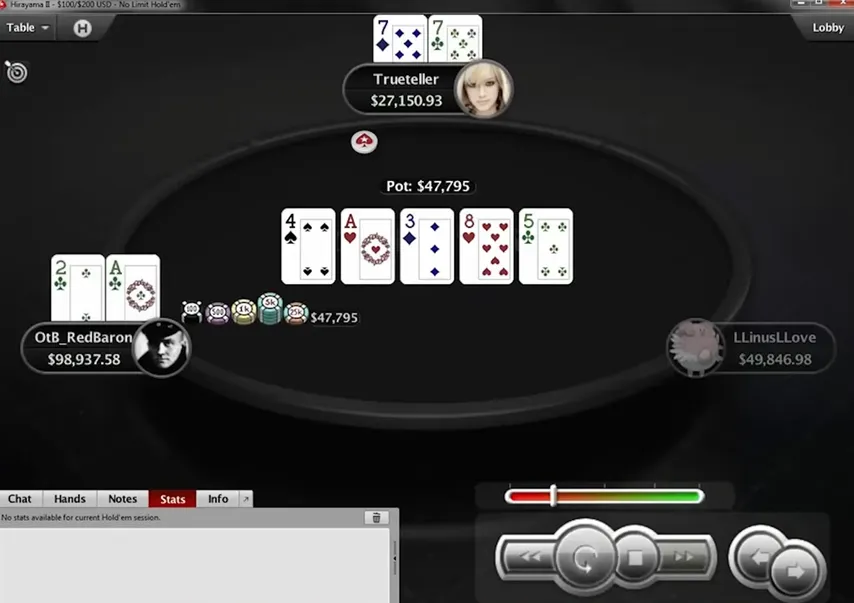
The Man Behind the Nickname
Brdz1: For me personally, OtB_RedBaron is a persona we don't really know anything about, which is for the best, because we can focus solely on his poker career.
We know that his name is Jonas Mols, and he chose his nickname OtB_RedBaron in honor of a German pilot, Manfred von Richthofen. Manfred was a fighter pilot during World War I. According to various estimates, he scored more than 70 victories in combat and died in the skies, a few weeks before turning 26. Manfred is still one of the best aces of his time. They called him Red Baron because the fuselage of his plane was painted bright red, and the pilot himself bore the title of a baron.

When Jonas added OTB to his nickname, he didn't know that in poker OTB stands for "on the button". He meant "only the best", and he used this nickname in a game Age of Mythology before he got interested in poker. His nickname was prophetic in some sense, but money and fame did not come to him quickly.
Regulars watched his career on a 2+2 forum thread where he signed up in 2010 and started posting hands and sharing his thoughts.
17/06/2010
"I play on Everest, but I think no one local plays there anymore. I wonder why, what do I miss? What do you think? Should I move to PokerStars and Full Tilt Poker like everyone else? So many people can't be wrong, right?
I play NL10 and NL100 during the day and MTTs during the night. Rebuy tournaments from $2 to $11 and freeze-outs from $5 to $50. My current bankroll is $1,100."
In replies, people suggested he enjoy a weaker European field for a little longer before switching to PokerStars or Full Tilt. Also, he admitted that he plays NL100 having only $1,100 in the bank, which is a super aggressive bankroll management he will keep for a long time.
24/08/2010
"Bankroll is overrated. What can go wrong if you play with 15 buy-ins for your stake? Worst case scenario, I lose half of my bankroll after two sessions. It hurts when they beat you at NL200, but then I can play NL100 for 5 days and get it back. Why do I need bankroll management in the first place if I don't depend on this money and can easily go down the stakes if I have to? I don't want to make 10 grand a year playing poker. I want to make either 100 grand or nothing at all."
Unfortunately, the graphs from this post were not preserved, but we can see that by autumn, he tripled the bankroll he had in July. But it wasn't always so easy for him.
Avr0rа: Today, those posts look a little weird, but back in the day, it was totally fine to start your poker career from the point of being an advanced amateur, especially if you come from a wealthy European country. Well, of course, CIS (Commonwealth of Independent States) players skipped this period, and it's clear why when we look at his posts, because 10 grand a year for CIS players is good money.
Also, we should point out that even though they had the idea of bankroll management, it wasn't as strict as it is today. A high number of buy-ins was required for those grinders who played many tables and who focused on the number of hands and poker room bonuses, which were very generous back in the day. Baron was never a grinder. He played a low number of tables and focused on his win rate throughout his whole career. He probably played four times fewer hands than Foyhayley, let's say, even though later in his career he had those crazy Zoom marathons.
Brdz1: At the end of 2010, Baron tries playing offline for the first time. He creates a huge post where he asks about full ring ranges, should he try playing a short stack, what to do against limpers, and is it possible to win $50 per hour at $5/$10.
There is Jonas Mols's profile on Hendon Mob with winnings of $57K. He played some tournaments in 2012 and supposedly played World Series in 2019, but offline play didn't impress him, it seems, and he never became an offline regular.
OtB_RedBaron's Journey to High Stakes
Brdz1: At the beginning of 2011, OtB_RedBaron tried playing NL1K, but not very successfully. On January 3rd, he had $32K, and in a few days, he had only half of that. Well, he didn't think of anything better than trying to play NL10K, and all of a sudden, he has 20% of his bankroll left. So he had to come back to NL200 for quite some time.
Avr0rа: Good old 2011. Yeah, it looks like those posts were made by some gambler. But at that time, he still wasn't a professional player. He was a very good amateur. Yes, he makes some money, maybe through deposits, maybe because of his skill level, but anyway, at that time he was a little over 20. He probably just didn't want to admit his defeat and really wanted to establish a foothold on NL1K.
Well, he ended up tilting and losing half of his bankroll, trying to get it back on NL10K and losing even more, so getting back to NL200, probably even making a deposit.

Actually, there are a lot of examples like that in poker. Overall, a lot of examples like that in our community. But it was a very interesting point of bifurcation for him. We either just keep on playing for fun and enjoy the game, or we turn into a professional player who understands that it is impossible to play successfully without strict bankroll management. We have to stick to a certain stake as well. We can't just climb 10 stakes up after every loss; it only leads to trouble.
Fortunately, he came to this point of bifurcation with a very good "starter pack". He was young, he had decent poker skills – I mean, he still played profitably on the stakes from NL100 to NL400. Well, maybe he didn't make like a lot of money there, but he was successful, so he had some skills. And the most important part, he was really motivated to get to high stakes. It's a great starting point for any career. So yeah, pretty much everything was on his side.
Brdz1: The results were constantly updated. After some time, he posted a very beautiful (even by today's standards) graph where all the lines are above zero.
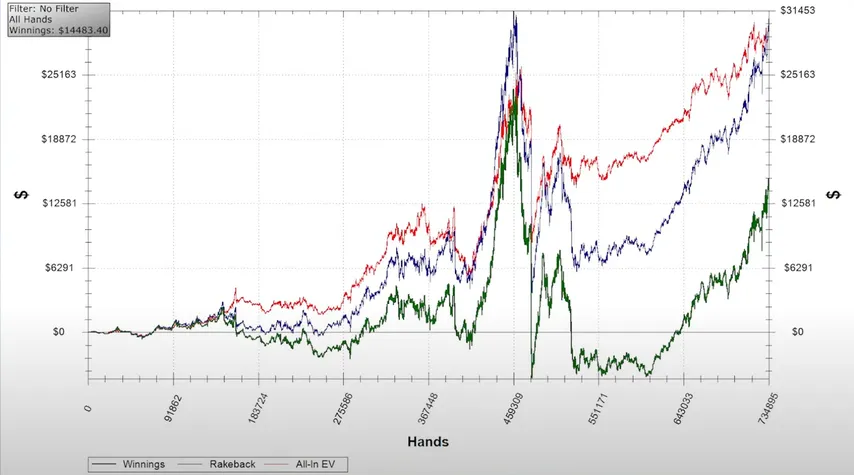
In the spring of 2011, Baron started visiting NL2K and even NL5K.
You can find his April graph on 2+2 with a very convincing red line.

Well, Forhayley and OtB_RedBaron claimed the stakes pretty much at the same time, but the approaches were different. While Forhayley was grinding like mad, playing tons of hands, Baron's approach was more like that of Mikita Bodyakovskiy, who played under the name Fish2013 and focused more on the quality of play.
Today we have fewer players who grind for the rakeback. They are still out there – like GGPoker has some really nice promotions, WPN (Winning Poker Network, with sites like PokerKing) as well – but back in the day, the promotions were amazing. VIP programs were much better, and those VIP programs allowed people to make a lot of money just by playing a lot of hands. It was hard to tell who improved faster as a player.
OtB_RedBaron's Marathons in Zoom 500
Brdz1: We're reaching the most interesting part of OtB_RedBaron's career. I'm talking about a couple of marathons he had in Zoom 500 (Zoom is the PokerStars version of fast-fold poker). It started with the legendary topic on 2+2 where he posted his results.
You need to understand the context here: before Baron used to play regular tables where you can actually pick where to play, and against whom you want to play. But in fast poker, you have no say in whom you're going to play against. For every hand, a new table of random opponents is generated, and it makes the game more competitive.
At a regular table, you can play against a rec pretty much all day, but at fast tables, you can play like 90% of hands against regulars. Also, 500 Zoom at that time was a place where a lot of outstanding high-stakes talents were forged, and where all of them sometimes came back to hone their strategy. So you had to play most of the hands against either very young, hungry, talented players who are basically the future of this game, or against very experienced veterans of the game who just came here to maybe try something new.
Avr0rа: At that time, you could find a game at 500 Zoom 24/7. People tried to reach Supernova Elite, the highest VIP status on PokerStars, and the room itself advertised this game a lot, so many recreational players came to play. They had this really cool ad with Usain Bolt, probably one of the most recognizable people in the world at that time.
With all the bonuses, top players had really high hourly win rates at 500 Zoom. There wasn't even a point for many of them to try high stakes. You could very easily reach higher expected value on NL 500 Zoom than on NL1K and higher. I mean, we don't talk about the highest stakes possible here.
Because of the huge volume, players from 500 Zoom were really good technically, and when they tried to gain a foothold on the highest stakes, they usually succeeded. They held the lobbies, they chased away the players from the previous era, let's say.
If you want real names from post-Soviet countries, first ones that come to mind: God of HU, 1nvoker, and LuckyCPS – one of the main Stefan partners. Those three played, I'd say, like around 10 million hands on Zoom 500 combined. In terms of foreigners: ja.sam.gale, one of the best players today, he played a lot of Zoom hands back in the day, and Zazano. He already retired, but the first name that comes to mind when you talk about Zoom is Zazano. And, of course, the OtB_RedBaron himself.
Brdz1: As you have already guessed, the task was not easy. The goal was really ambitious: to play 100K hands in Zoom in 20 days with a win rate of at least 6 BB/100. It's a really decent win rate for mid-stakes bum hunters who play much less hands per hour in much softer pools. So even back in the day, it was at least questionable, considering that the top players were making around 4 BB/100 at NL 500 Zoom.
When Baron was asked about which tables are better for development, Zoom or regular ones, he said there's no difference, but maybe Zoom tables are even better.
Avr0rа: In my mind, I remember it as "Zoom punishment" because not only do you have to play a lot of hands, but you also need to have a very good win rate. So you really need to dive into the game.
There's something to learn for us from Baron. He wanted to play the highest stakes, and he had a goal of getting into shape.
Brdz1: Well, it was a roller coaster right from the start. He lost a lot of money in the very beginning and even had to play NL 2K to replenish his bankroll.
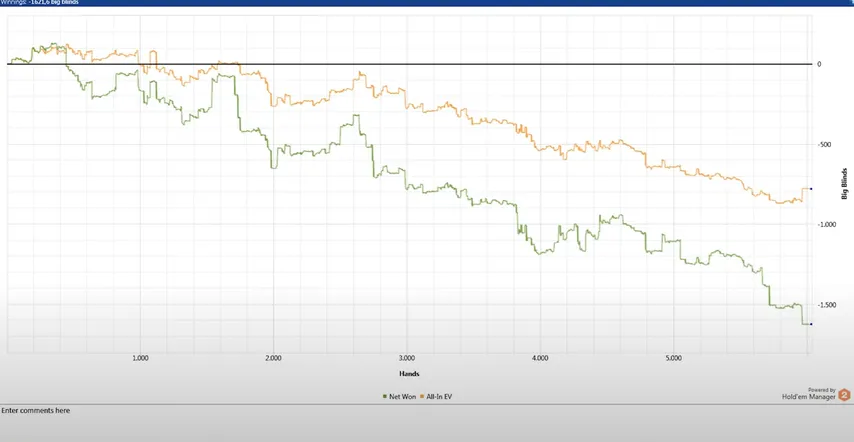
Although he himself knew that the marathon was really ambitious, and when they asked him about the expected win rate, he answered:
"I think I can reach 6 BB/100 for 100K hands in 25% of cases. It depends on luck. There are some great regulars at 500 Zoom, but they are a minority. There are also many break-even grinders with Supernova Elite status, weak mid-stakers, and few coaches, and around 1/8 of the population are fishes."
After 40K hands, OtB_RedBaron had a win rate of 7.2 big blinds per 100.
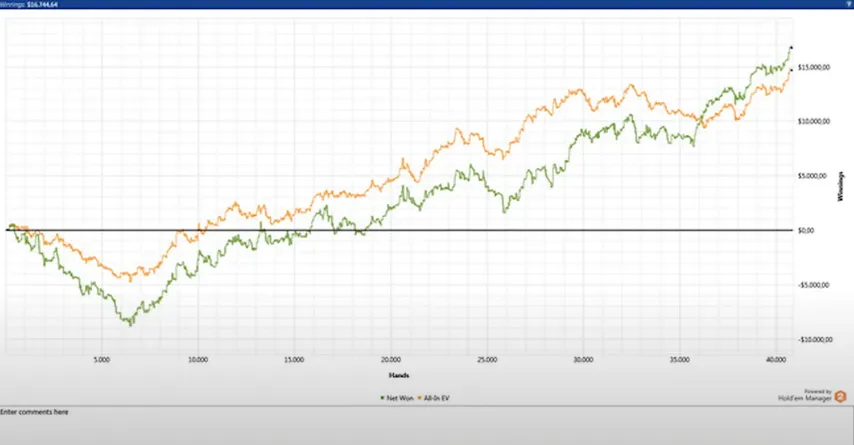
"Of course, I've been very lucky, winning flips, catching many sets and three-bet pots. On the other hand, I have no luck in 4-bet pots and often hit undersets. I feel like I'm playing at A-level, definitely can do better. Tilted a little, but not too hard. Doing well with the volume! I have decent samples on some weak regs and it's going to be tough for them in the follow 50,000 hands. If I play a little better, 6BB/100 win rate looks pretty achievable."
Profiting Even with Break-Even Redline
Brdz1: If we take a look at OtB_RedBaron's graph, we can see that his red line was almost break-even, and this is how he explains it:
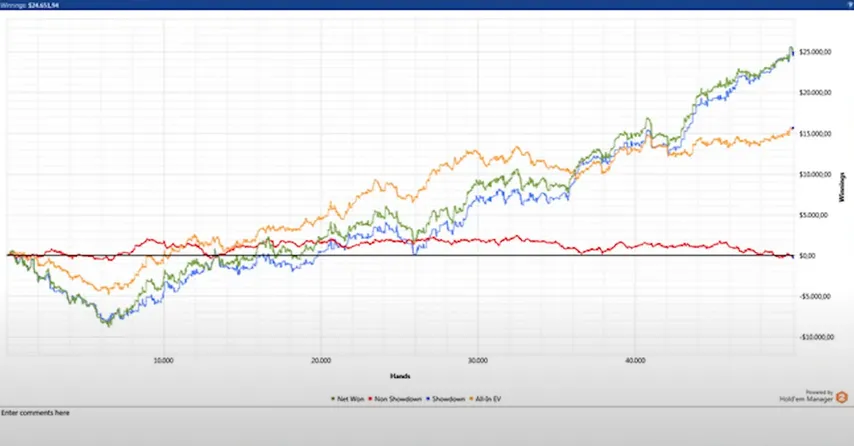
"My red line is slightly above zero because I am a bit station and because of all of those nits at NL500. If you'd like to know, I rarely use overbets, don't value bet thinly enough, and play in a super standard 23/19 style. Clearly, it is better to bluff in spots where you are not expected to bluff, where you have poor equity when called, and where your range demolishes villain's range (especially if his range is capped)."
The debate on the red line has been going on for a very long time and is unlikely to ever end.
A red line depends on your style of play, but one thing we can say for sure: players of different styles, even totally opposite styles, have reached huge success in poker. For example, MunEZ's red line goes down, Stefan's red line goes up, and oSpiel888's red line stays at zero. Every one of those players can be considered the best in the world at some point in their career.
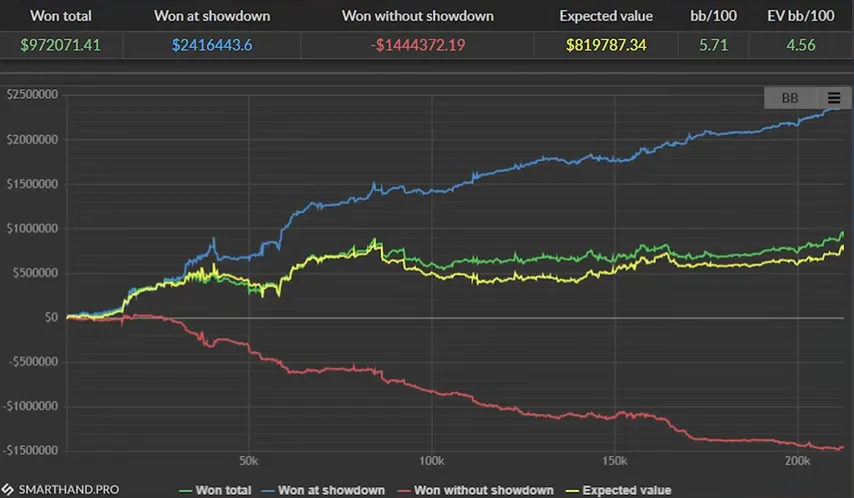
Every one of them played in very tough and very expensive games.
So it's a matter of taste and psychology. Some prefer an attacking style of play like Stefan, Linus, and Enl1ght, and some prefer a defensive style of play with a lot of traps like MunEZ or oSpiel888. Linus actually had a period in his career where he played with a lot of traps. It is obvious that at this level, you have to develop all the parts of your game, but your character and habits leave their mark.
Avr0rа: Among the people who participate in wars to gain an edge, meaning that they don't just hold the lobby waiting for weak players to come but really trying to outplay other regulars, not so many players try to create something new, try to rock the game, try to put their opponents in a bad position. Well, maybe among them Stefan, ja.sam.gale. They use underbets, overbets, donk bets, and some weird lines to confuse the opponents. But those players are definitely a minority. Most of the players play pretty much the same. So we have this foundation on which we put our specific exploits, let's say.
But at times when Baron played, it was totally different. Not as different as in Forhayley's time a couple of years before, but really different. All the regulars had their own style. Even preflop ranges could have varied drastically between regulars. You could have folded 70% against 3-bets and still be a very successful winning player. Tuff_shark is a great example.
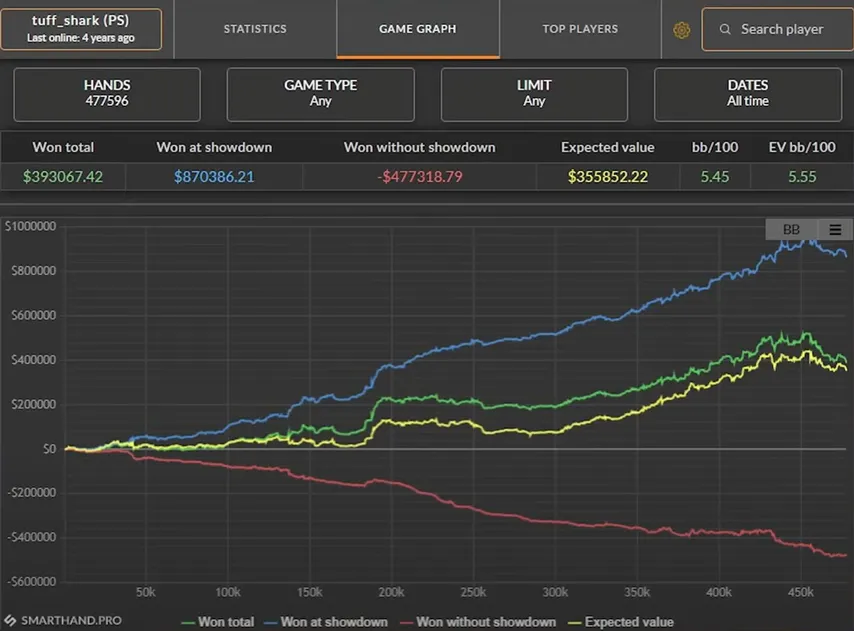
This is the guy who played NL1K mostly and was successfully folding most of the hands against the 3-bet.
Or we had guys like King10clubs, one of the best players on NL400 and NL1K. He won the most on those stakes, and he folded to 3-bets around 40%.
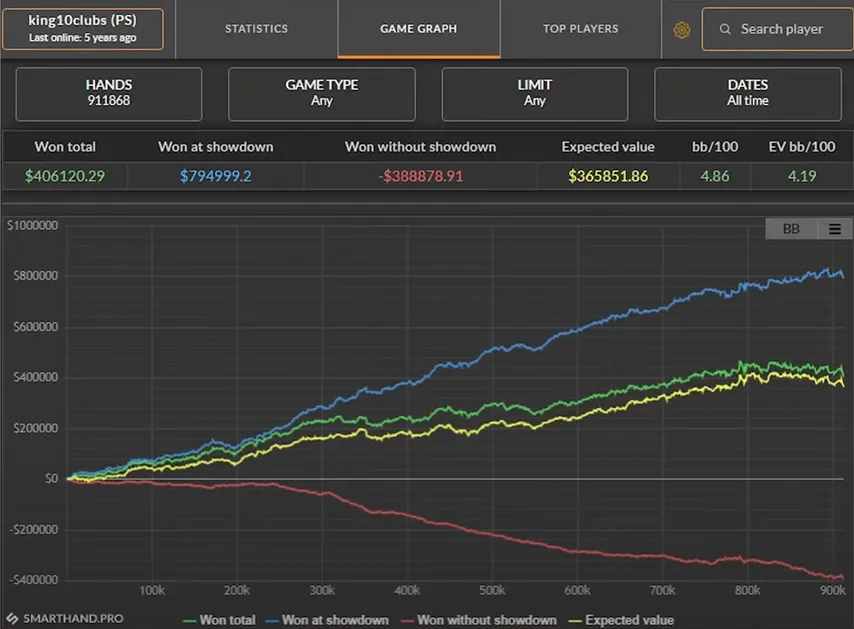
Brdz1: Those marathons became the place where Red Baron actually communicated with the poker community. He expressed his opinion on educational videos, for example:
"I only watched three videos and all of them were terrible. I hired a coach year and a half ago, but it was a waste of money and time. I don't think it's always pointless to hire a coach, but it was in my case. The skill difference between the coach and me was very small, if there even was any. I mostly played NL 200 and he was considered a mid-stakes killer, but it probably wasn't true. By the way, he's looking for backing right now. When I feel like I've hit the ceiling, then I will probably start looking for a top coach, not a professional coach but a well-known high-stakes regular. I don't agree with the idea that every high-stakes regular climbed the stakes thanks to discussing hands with other players. In my opinion, most of them worked on their game on their own."
Well, this is a very interesting take. To my knowledge, many top players of that era, like Red Baron or Kanu7, worked a lot on their game alone. I remember Forhayley saying in his blog that if there was one player he could see all of the hands without showdown, he would choose Kanu7 because he actually worked on his game alone, and this led to some very interesting ideas.
We should also point out that most of the OtB_RedBaron era was pre-solver. Now when we work on our game, we have some sort of a starting point – well, maybe not 100% reliable, but even still – and the study of equilibrium really propelled the technical aspect of the game in recent years. But I remember the times when we could only rely on our logic when analyzing the hands, and we used to dispute hands with friends until some of us ran out of arguments. Nowadays, a lot of spots can be checked in solvers in just a couple of seconds, but at that time, analyzing hands and making conclusions was even more important than today.
Maybe if it wasn't for the lack of solvers, we would have never seen this exact Red Baron with his amazing logical approach. I am pretty sure even now many players are using Baron's tactics, even though they don't even realize that he created those. This is how huge his impact was on the technical side of the game.
Avr0rа: There's a theory that Baron was the first one to lay his hands on the advanced software, and this is how he created the gap between him and others, but I don't believe that. I've played against Baron for many years, he is my unspoken coach, as he was for many of us, and his game is actually very human-like.
There's tons of logic in Baron's game. Range versus range plays, human-like traps, and his own ideas. If we compare him to OBORRA, who was a cheater banned for life in 2014 for using third-party software, well, it's like day and night. When you work with solvers, it implies certain patterns in play that were completely lacking from Baron's game. So yeah, I actually believe this theory to be incorrect.
What about the famous "great cooler" concept? This was the concept about Baron from back in the day, and I think it actually proves that this theory is incorrect. One of the top players, maybe Jayser1337 or maybe someone else who played a lot against Baron, noticed that Baron wins too many coolers, especially in flush-versus-flush spots. He too often has a better flush. Like, what the hell? He always shows a better flush. How is that even possible?
It made some people paranoid even. So at some point, people started analyzing his hand histories (it was totally legal back in the day), and it turned out that there's no room for paranoia. He just plays his one or two card backdoor flush draws pretty much perfectly on the early streets – he just keeps those flush draws that dominate, and with the weak draws that he would most likely lose with, he tries to make his opponents fold or just to keep the pot small. So his whole strategy from the very beginning was aimed at being on the right side of the cooler.
Brdz1: His first marathon ended on February 24, 2012. It took 44 days instead of 20, and his win rate ended up being way too low – 3.87 BB/100.
He was actually quite positive about it:
"I cannot say that I am devastated by the results. In the end of the day, 3.8 BB/100 for 100K hands without any table selection against tough opponents of 2012 is not a disaster. I also managed to make $33K ($27.1K profit, $4.8K rakeback, and $1K promo), $215 per hour, not taking into account MTTs and playing other stakes."
Right after the first marathon, OtB_RedBaron announced the second one: 125K hands with a win rate of 5 BB/100 at least.
"If I make it, I go back to NL 1K. If not, then I play 125K Zoom hands more as a punishment." This was his plan, but it went all right. He found a nice NL 5K table and got super lucky. He ended up minus $15K in all-in EV but plus $52K in real winnings.
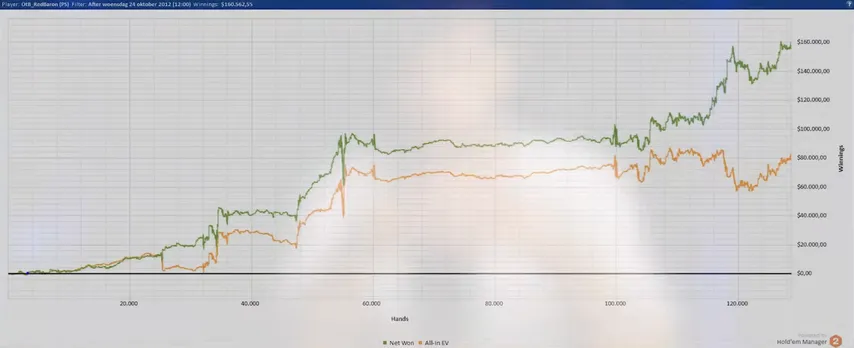
He finished the marathon on November 30th. He played around 100K hands at Zoom and the rest on higher stakes and was very successful. His Zoom win rate was 6.4 BB/100, NL2K 8.5 BB/100, and NL5K 13.7 BB/100.
In 2013, he kept on grinding Zoom, and by the end of the year, his green line at Zoom was around $120K. After an unsuccessful shot at NL5K, he aimed at playing high stakes at regular tables. He kept on posting his reports and in January, he made the same amount of money he won playing PokerStars Zoom for a year.
Introduction to Solvers and Game Theory
Brdz1: At this time, he started working with solvers:
"I worked a lot on my game in the last few days, studied simplified game models, tinkered with Hold'em Manager filters, created my very first game tree in a CREV, realized how hard poker is and how little I know. Highly motivated."
Avr0rа: Poker software evolution was a long process. For young players, it would be funny to see what we did before the solvers came out and in the first days of CardRunners EV (CREV). Also, some similarity to chess here, because for young chess players today, it would be probably fun to see how old players worked on their games before the computers came out.

I, for example, remember that at some point, I had to calculate the discriminant to determine equity realization. My coach at the time, who was very good at math, came up with his own formulas to estimate equity realization, and you had to calculate a discriminant for those. And of course, it was very far from reality. For example, according to his estimations and calculations, it wasn't profitable to defend against a 3-bet – you had to fold like 80% of hands. None of the suited connectors were profitable to defend according to him, and when I asked him why all the top regulars make those hands profitable, he just said, "Ah, they are lucky."
CardRunners EV was a more powerful tool, but it wasn't clear. I mean, you could have dived too much, you could have leveled yourself pretty much, and you could have ended up in a situation where you still have no idea whether it's profitable or not. For example, a very strong theorist of our times, Bootie, who is still a very strong technical player today who really understands solvers. He spent many hours in CREV and came up with a theory (and he also kind of proved it with models) that position in poker doesn't matter at all.
I mean, now he would probably laugh at that, but at the time, he proved to me and Jayser1337 that position actually does not matter at all in poker, and it was a whole big new thing. I don't know how he came up with that, but probably, he just got confused in his own models.
Brdz1: Over February and March, Baron made another $120K. He complained that he's worked too much with software and he doesn't even know if it's worth it or not.
Well, now we know that it was worth it, and in April, he made another $100K.
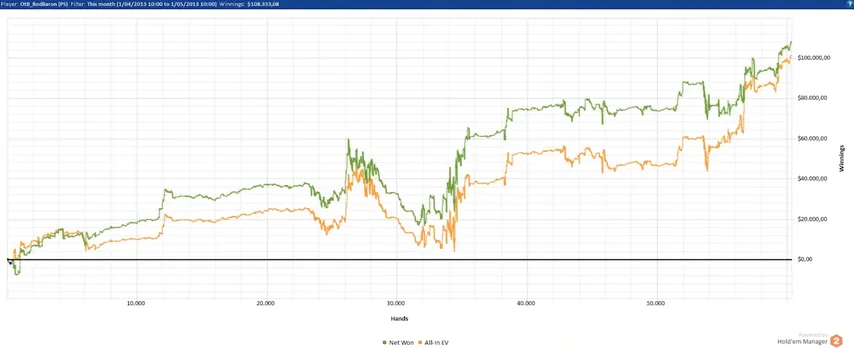
This is what he said about his strategy:
"I tried to play GTO poker more and exploitative poker less (essentially, I just wait for some huge mistakes and then exploit the most monstrous leaks), but it's hard to play close to optimal, because I have no idea how GTO strategy looks for 100bb stacks. So, it is safe to say, that I just build a solid strategy that works against an average/unknown/solid opponent. It's hard to find such a strategy's weak spots, which makes me bet not too often, fold not too often, and play more or less balanced in the common spots. "
Over the summer, fighting against Forhayley and other top regulars of high stakes, he lost about $150K. But then he said that he enjoyed those games the most and that he learned from it a lot.
Avr0rа: Now, we gradually immerse in the most fun part of our story when he started crushing high stakes.
He didn't just get a foothold on high stakes, he destroyed it.
OtB_RedBaron's High-Stakes Dominance
Avr0rа: There's also one legendary story when people analyzed Baron's win rates from different positions. They found out that he actually makes money from the small blind. His win rate on the small blind is positive. Let me explain the technical part of it:
The small blind is a position where we put dead money into the pot, and according to the mechanics of the game, it is impossible to have a positive win rate on the small blind over a big sample.
To make money on the small blind over, let's say, 100K hands, you have to be very lucky and you also need to have a huge edge over your opponents, and you need both of those things at the same time. Without a doubt, hundreds of players tried to figure out how he managed to do that.
He actually played very well in these small blind versus big blind spots. He was far ahead of his time in understanding range-versus-range interactions in wide spots. He knew when you cannot c-bet wide, and he also knew how to punish those who didn't know that. So he gained in both spots, and he was really good at heads-up. He wasn't a heads-up specialist, but top heads-up players of this time, who often came to six-max to play maybe some heads-up against weaker oppositions, never aimed at Baron. Not so many people were happy to join tables that RedBaron started.
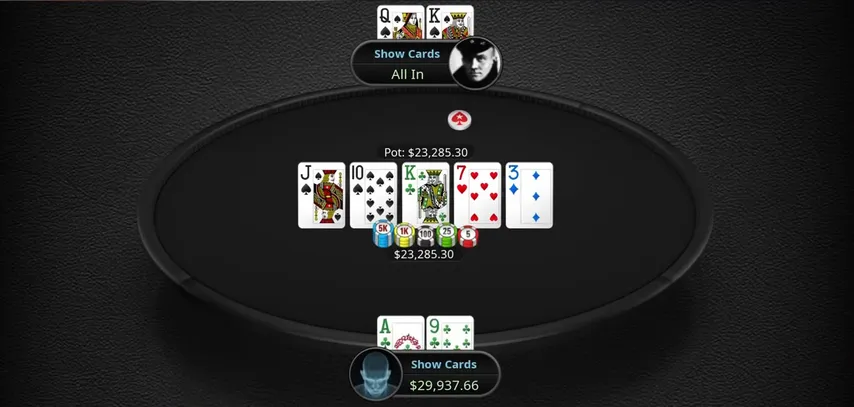
1nvoker has said in one of his videos that he understands the ranges and frequencies of RedBaron even better than RedBaron knows his own. It is funny but it is also pretty accurate.
Later on, his 2+2 journal was closed, and regulars from all over the world watched his ascension. For example, in the summer of 2015, he played in the most expensive game on PokerStars in a really tough battle against Kanu7 and Phil Ivey himself. He ended up winning $367,430.
Let me go over one of the most iconic hands from this session, one of the most popular hands of my times. I've spent hours and hours discussing this hand, and watched an hour-long video of Ben "Sauce123" Sulsky analyzing this hand.
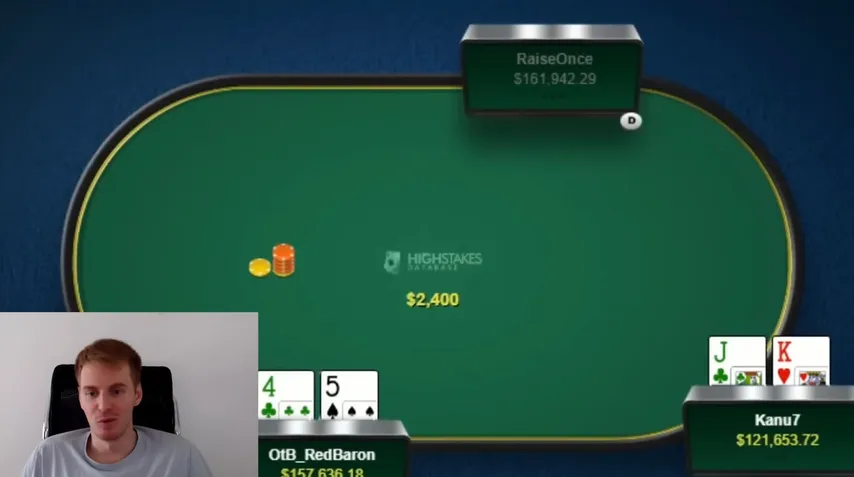
So let's take a look.
300 big blinds deep, Kanu7 is a very, very, very strong regular from Great Britain. His name is Alex Millar and he's made a very popular educational series. He was one of the best of his time. And "RaiseOnce" is Phil Ivey himself. He mostly played mixed games, but sometimes he enjoyed playing No-Limit against the top regulars.
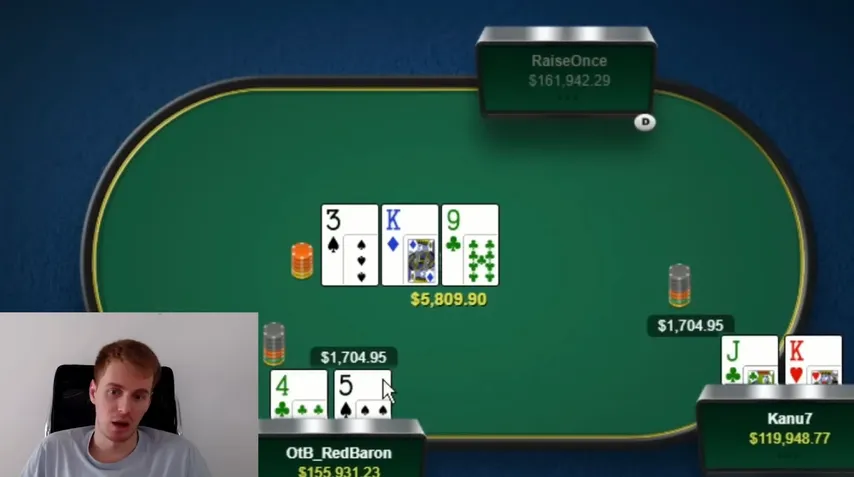
300 big blinds deep, I mean, nobody now understands how to play 300 big blinds deep and how the c-bet strategy should look like. So, of course nobody understood it back in the day. So, it is impossible to say which hands Kanu will check on this board. I mean, I can assume that 300 big blinds deep, the hands that struggle the most are pocket Tens, pocket Jacks, and pocket Queens. So we don't really want to c-bet those, and it is reasonable to check those hands, especially against a strong opponent.
So Kanu's checking range looks like this: some draws, some made hands like , , some combos, and some strong backdoors. I think the most important part here is not to overdo it with draws. You should have the right amount of gutshots and backdoors in every line so that when those draws complete, you have all those nutted hands in your range.
For Baron, this spot is much easier because the dynamics of the board works in favor of the guy in position. We can wait until the board develops in a way that we have some sort of advantage and then figure out decent sizings and bluff candidates and make our opponent play a guessing game where he has to guess whether we have enough bluffs in our range or not.
So we can say that in this spot, Kanu7 is the one defending and RedBaron is the one attacking, even though he called preflop. But yeah, those spots with deep stacks are really tough to play out of position.
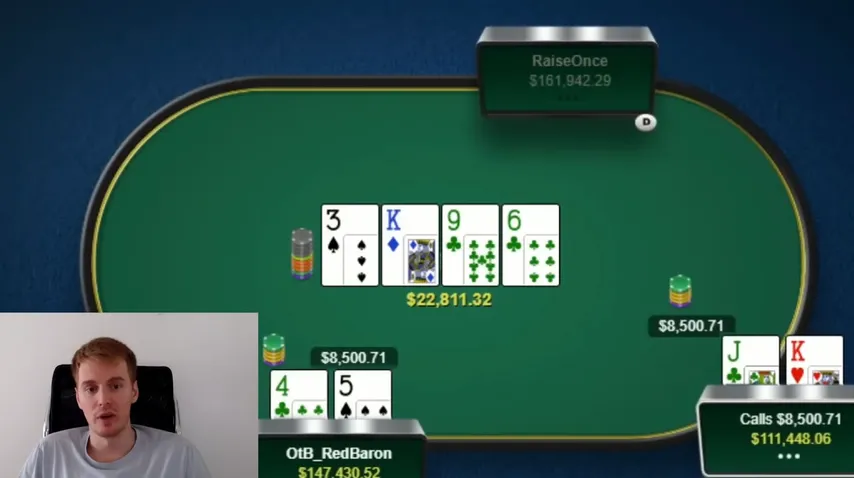
So Kanu7 calls, a flush draw comes on the turn, and RedBaron overbets. He can even play a mediocre King like that, like . So of course, for Kanu7, there's no way of folding this hand. He has outs for decent two pair combos, he can beat value here. It would be a tough decision for combos. We can, I think, fold all of those Tens-Jacks-Queens and then call sometimes and some draws.
To me, it's really interesting how often RedBaron should bluff here without equity.
According to solvers, we have to play cocky here. We have to bluff sometimes with hands like, I don't know, even with a , so that we have some bluffs on the completing runouts and put some pressure on our opponent.
But no one played like that at those times, and this is again an argument in favor of Baron not using solvers before everyone else. Solver play implies those non-equity bluffs in different spots, but Baron's play was always more about logic, using some blockers, and so on.
And here, of course, it's an easy decision with an open-ender, considering the river card especially. But, on the turn, it is a standard bluff. He folds out some draws that are stronger, he can keep on bluffing on river, he can keep on bluffing on a blank, although I don't think it is necessary. He folds enough hands on the turn, he has a lot of fold equity, and he has very clean outs of and .
And the key point of this hand: Baron shoves 5x pot on the river.
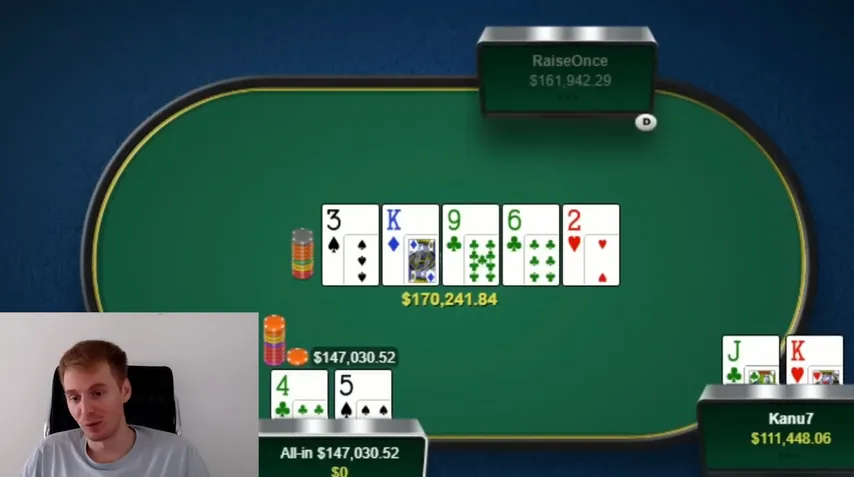
You don't really often see 5x overbets even in today's games. And consider what Kanu felt at this time. He is playing against Phil Ivey and the best player of this time, OTB RedBaron, and he probably realizes that he would play for a couple of hours and then it won't happen again to him, maybe ever. Most likely, those players will never play at the same table again anymore. So it's a unique spot and we face a 5x overbet shove. The price of this decision is just immense.
And how he managed to find this call, it was probably, I think, an emotional decision. Yeah, it was a very tough one. I mean, logically, it's not a very good call. Sauce123 analyzed it very well, and he said that if we call a top pair against such a shove, he can easily shove like with that all of his bottom sets. So we have to call the top part of our range, we want to at least block his sets, so we want at least two pairs. We have some top sets in our range, and we don't need to call a lot against such an overbet. We can fold like 90% of our range and it would be totally fine.
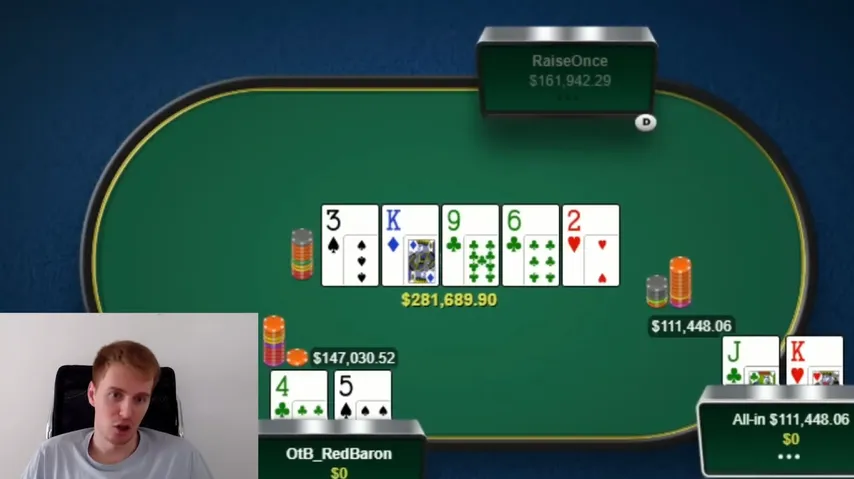
I don't think it's because he is a weak player, I think it's because of the pressure, and the big stacks.
In 2015, everyone was talking about this hand. Probably the biggest highlight of RedBaron's career was this game against Phil Ivey. It didn't last long, but come on, it's Phil Ivey. It's like playing against David Beckham in football. It's a really huge thing.
I also should mention that NL40K in 2015 was a very, very expensive game. I mean, now we have all those high stakes games on GGPoker and so on, but back in the day, yeah, it was a lot. It's like if today someone starts an NL200K game. It was a very special thing.
OtB_RedBaron's Career Earnings
Brdz1: In 2015, HighStakesDB, a website that hasn't been updated for quite some time now, has Jonas Mols as number 29, next to Tom Dwan and Berri Sweet, as one of the most winning players of all time with a profit of $2 million.
Avr0rа: I am totally positive that Baron has won much more throughout his career. I am sure it is more than $6 million, which is a great result for those times when the highest games were NL10K, and it also happened quite rarely. So people mostly played NL5K, sometimes NL10K. So it's quite different from what we have today.
For his times, RedBaron's results were just amazing.
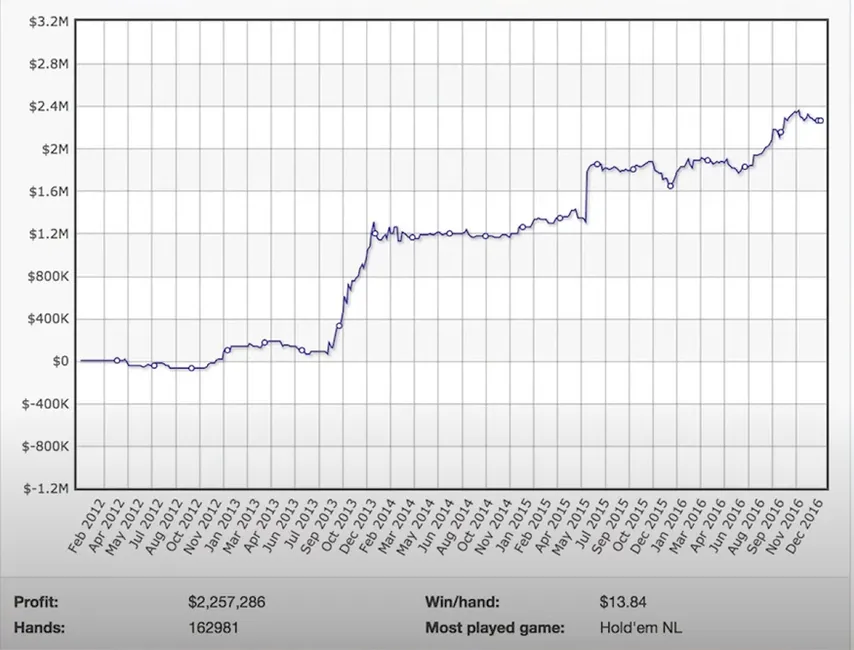
Also wanted to talk about those tracking websites. Today, poker rooms are fighting really hard against those, and it wasn't like that in those times. PTR (PokerTableRatings) and HighStakesDB worked just fine, and regulars were competing for the biggest winnings, for some achievements. Everything was public. Reporters were discussing winnings all the time.
At the beginning of the summer, people were already fighting for the top spot in terms of winnings. So yeah, everything was public.
Brdz1: Over time, RedBaron had a reputation of a player that is very tough or even impossible to beat. And of course, in 2015, when we were playing micro stakes with my friends, we weren't able to wrap our heads around the dominance of that guy. But the way the top players, like 1nbokrt, were talking about him was a lot for us
At that time, studying Baron's game was something normal, even for micro-stakes players. He is probably one of the most analyzed players in the history of the game.
We should mention that he was quite lucky at the crucial points of his career. It's that combination when a really, really good player also gets quite lucky. Besides him simply outplaying you through logic, he also gets Aces against your Kings, and that, of course, can make things even worse.
The End of the OTB_RedBaron Era
Also, a very important and interesting part of Baron's career is the part when Forhayley retired from poker. When he stopped playing as much, Baron became the king of any lobby, and nobody wanted to play against him. Nobody gave him any action when he started tables.
A funny phrase was born at that time: "The first after the Baron."
What does it mean? The most popular room was PokerStars, of course, and at Stars, when starting tables, two players could have sat at the table without playing. So if there are three players at the table, you have to start playing. If there are two, you can just sit there waiting for weaker players to come.
This is how it looked:
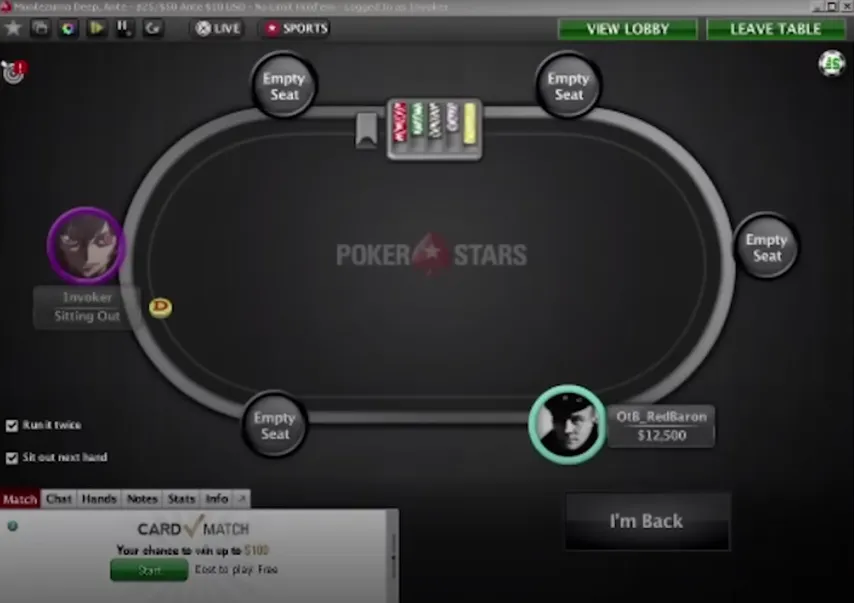
So, "The first after the Baron" is the guy who sits with OtB_RedBaron at the table, waiting for weaker players for the game to start, basically.
And when Baron was not at the tables, people were fighting like 3-max, 4-max wars just to have this opportunity to be the one sitting with Baron without playing. It was like a title of some sort. So yeah, no one wanted to play against him. It sounds funny for today's environment, but this is how it was. Many people were fighting for this title, even myself included. I played like maybe 30K hands in those reg wars. Well, I started doing it in 2016 when Baron already played much less.
In 2016 and 2017, Baron was still very good, but because no one wanted to play against him, he became lazy. He didn't occupy lobbies as much. He came for like 2 hours, and after seeing that there were no games, no action, he left. And that was the time when all this action, all those reg wars used to start.
And this one time, I decided to war against Baron. So we play: me, him, and one other guy, and after some time, Antonius, one of the top regs of those times, PMs me: "Why the hell do you even play against RedBaron? Just wait a little bit, he will leave these freaking tables, and you will get your spot at the table. So don't poke the bear. He will see that there is some action, he will smell some blood, he will get into shape, and you won't be able to chase him away."
So everyone was like, "Just leave him be, leave him at this table, wait for a couple of hours, and then you can finally play some decent games." It's funny now how those wiser colleagues of mine tried to teach me what to do against OtB_RedBaron.
I remember this moment really well when everyone was like, "Don't poke the bear, it will only make things worse."


